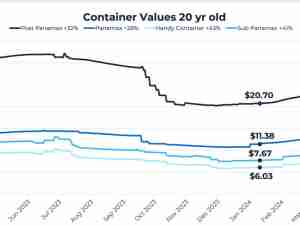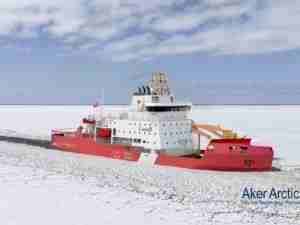The effort to amend the previous weight limit for cargoes moving through Pennsylvania was mounted by PRPA staff in association with terminal operators, shippers, trucking companies, and cold storage operators. Weight limits and other regulations governing the movement of commercial cargoes over Pennsylvania's highways are set by the Pennsylvania legislature and administered by the Pennsylvania Department of Transportation (PennDot).
"I want to commend everyone involved in this important effort, especially House Transportation Committee Chairman Richard Geist, who sponsored the legislation and helped us guide it through the legislative process," said Mr. McDermott. "This initiative demonstrates, once again, that the Port of Philadelphia and the Commonwealth of Pennsylvania care deeply about the industries that use our facilities. We are committed to assuring not only the best on-dock facilities for cargo, but to assure that inland transportation, whether by truck or rail, will happen with the greatest efficiency and convenience."
Previous victories by port officials involving this issue included amending state weight permit regulations so that trucking companies could secure an annual permit to carry containerized cargo exceeding 80,000 pounds, up to 90,000 pounds, replacing the previous system where permits for heavy container loads had to be secured on an individual-shipment basis. Now, trucking companies carrying refrigerated meat products can secure an annual permit to carry up to 107,500 pounds.
"This legislation was the end result of a cooperative effort to contain the costs associated with importing refrigerated and frozen meats,' said PRPA Chairman Brian Preski, Esq. "The consumer is the ultimate winner here. By allowing heavier containers, shippers can take advantage of economies of scale to keep transportation costs low, resulting in lower end costs to consumers."
Industry response to PRPA's successful initiative to increase the upper weight limits for refrigerated cargoes has been gratifying. "This is great news for everyone," said Mr. Laurie I. Bryant, Executive Director of the Meat Importers Council of America, Inc. (MICA). "The Port of Philadelphia has been a valuable friend to our industry for close to thirty years. This latest victory is yet another great example of the Port's commitment to our trade."
The lion's share of frozen meat cargoes entering the Port of Philadelphia consists of grinding meat originating in Australia and New Zealand. This meat is a prime component in most of the hamburger patties sold in our nation's fast-food restaurants, and is also a main ingredient of other processed food such as pizza toppings and seasoned ground meat for tacos.
The primary ocean carriers delivering this cargo to the Port of Philadelphia are Hamburg-S'd, P&O Nedlloyd, CP Ships, and Maersk.








